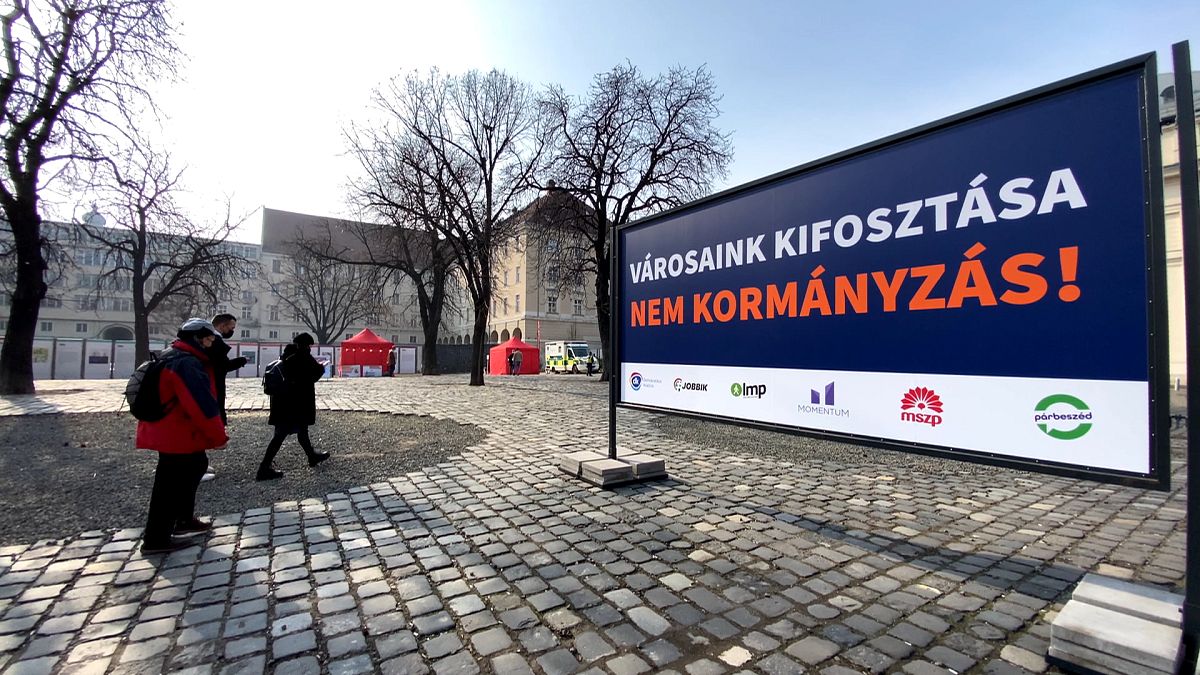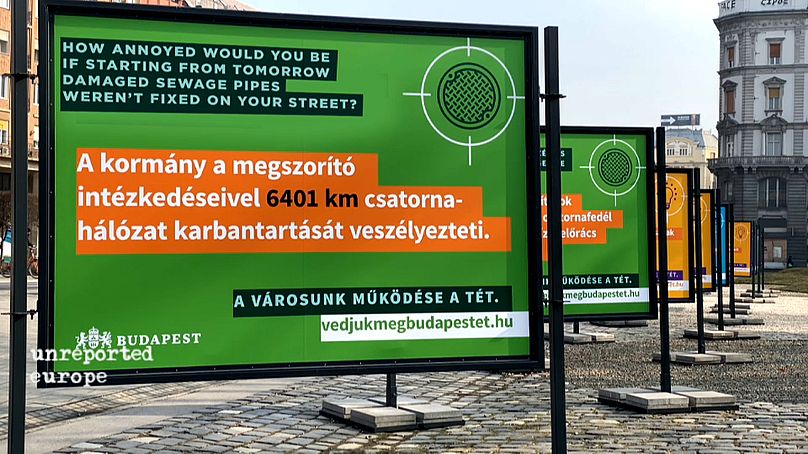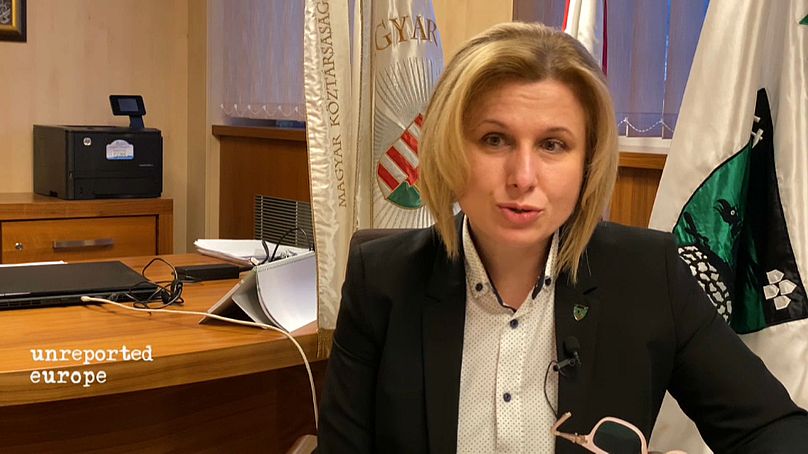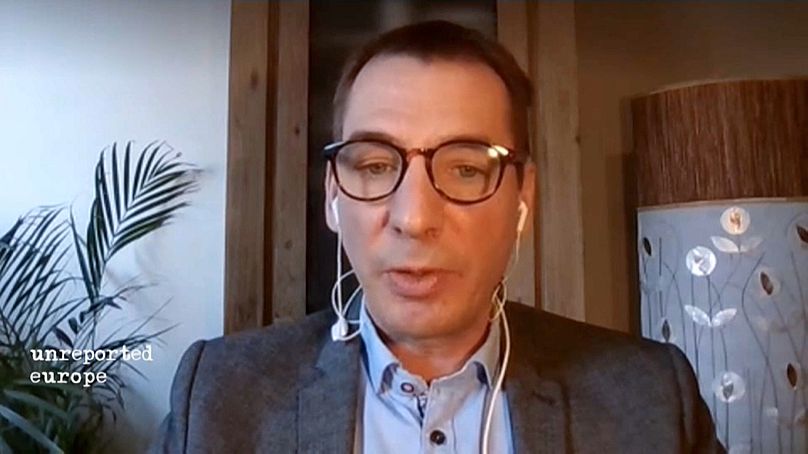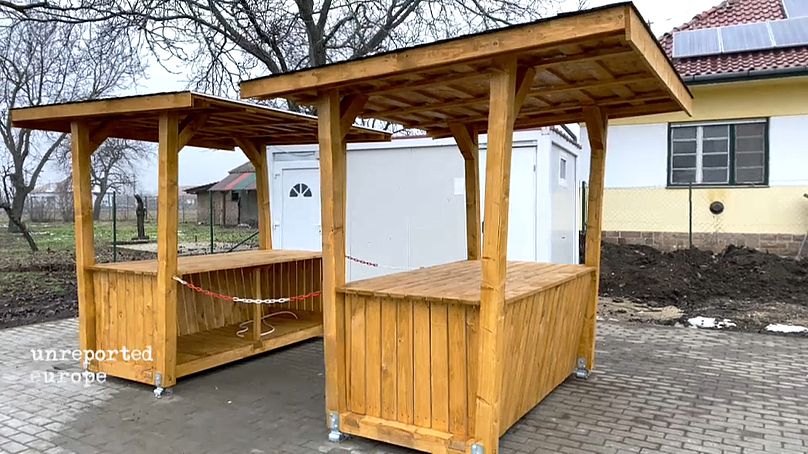Opposition mayors in Eastern Europe are raising their voices against corruption and populism. We take a look at Hungary where they're accusing the central government of deliberate financial cuts to opposition-led municipalities.
Opposition mayors in Eastern Europe are raising their voices against corruption and populism. In Hungary in particular, this fight is very visible. Signs of political distrust between city mayors and Hungarian Prime Minister, Viktor Orbán, are literally popping up in the streets of Budapest.
Billboards listing 25 examples of how the national Hungarian government is allegedly threatening the functioning of the municipality with financial cuts have been placed in front of the Budapest City Hall. They are the capital’s opposition Mayor's open challenge to the Orbán administration.
The most fundamental public services have been cited on the billboards. They range from street lighting to district heating to public transport. One of the most striking billboards reads:
How annoyed would you be if starting from tomorrow damaged sewage pipes weren’t fixed on your street? The Government’s restrictions endanger the maintenance of 6401 kms of pipes. The functioning of the city is at stake.
Its final warning is perhaps the strongest: Looting our cities is not a way to govern!
The Budapest city government feels like it is carrying a heavy financial burden. The pandemic has reduced its income by 20%, while another 20% is at risk due to the national government’s austerity measures. The mayor of Budapest, Gergely Karácsony, says the Orbán administration is punishing opposition-led cities.
Karácsony informed us that "the most important source of income for Budapest is the business tax, paid by local businesses. The Government reduced it, cutting a significant sum from the city’s budget. But he says that Budapest still has to pay an increased “solidarity tax”. According to him, "these two elements combined are making Budapest almost bankrupt".
The solidarity tax in Hungary is expected to help support lower-income cities. The national government argues that wealthier municipalities need to share the financial burden and crisis created by the pandemic.
Mayors united
The Budapest Mayor is not alone in his fight against the government. Dozens of other liberal pro-European opposition Mayors have taken up the cause since the 2019 municipal elections when the anti-Orbán opposition surprisingly won almost half of Hungary’s big cities.
Several of them recently met in the city of Tatabánya to coordinate their response to their dwindling finances. Ilona Szucsné Posztovics is the mayor of Tatabánya. She agrees full-heartedly with Karácsony and told us that "the Hungarian Government is discriminating between cities led by mayors of the ruling party and those led by opposition parties". She gives us the example of the 24th of December when big cities led by Fidesz received 3.5 million euros in aid, while pro-opposition cities, like hers, didn't get a thing.
EU funds
Opposition Mayors also say that European funds are not equally distributed. A group of them made the bold step to ask for access to EU funds directly, bypassing their national governments.
Budapest's mayor recently signed the "Free Cities Pact", with leaders from Prague, Warsaw and Bratislava and they presented themselves to the EU as alternative partners to their national governments. These countries are part of a group of countries that are often accused by the EU of violating the rule of law.
Karácsony tells us that one of his motivations for signing this pact is public opinion. According to him, "more and more people in Europe are outraged because EU development funds finance corruption and autocracies". He tells us that the mayors in the "Free Cities Pact" do not want their cities to suffer from this.
The EU budget and pandemic recovery fund
Mayors have proven they’re capable of promoting change on an international level. The European Parliament has decided that member states must now consult with local authorities before finalising their national Recovery and Resilience Plans. It's something opposition-led municipalities have been lobbying for, for over a year.
However, Benedek Jávor, Budapest's head representative in Brussels sees a problem with this. He tells us that "this consultation obligation was not written in the law. But now it's adopted". He wonders how it is going to be implemented. He says that the Hungarian government is already "trying to prepare, adopt and submit to the European Commission a Recovery and Resilience Plan, which was not consulted with the most important municipalities of the country".
The Orbán administration, on the other hand, says it’s ready to negotiate with opposition mayors.
Public works in Hungary
How money is shared in Hungary is somewhat shrouded in mystery. The NGO, Transparency International, says corruption has become institutionalised there, especially through calls for tenders. Józssef Péter Martin, director of Transparency International Hungary, says "according to the statistics, 40% of the Hungarian public procurement procedures have only a single bid" and "around a quarter of EU funds were channeled through the government’s close oligarchs and cronies in past years".
The EU anti-fraud office has opened over 40 inquiries into alleged misuse of EU funds. Akos Hadházy is an independent member of the Hungarian parliament. He took us to some villages northeast of Budapest to see some examples of what he calls "fraudulent practices".
Our first stop is Visznek, where money was apparently allocated to a park that has never been finished. Hadházy calls it "a typical example of how the European Union taxpayers’ money is stolen". He says the sum, 220 000, isn't a huge amount, "but we can only see a lake here" and that "existed before. They did not carry out what was in the tender: they should have made a park".
Hadházy agrees with Hungary's opposition mayors. He believes that in the counties "Fidesz politicians decide which village can receive EU support. Only those where people vote 'correctly', so where they vote for the ruling party, they get the money". He also says that these politicians dictate what firms will carry out the public works.
He also takes us to another "questionable project". In a small village, a marketplace was supposed to have been built in 2017 with 80 000 euros of European Union funds. To this day the market is still not finished. Hadházy argues that the work could have been done for 80% less. He even makes the bold claim that between 20% to 30% of EU funds end up in the wrong hands in Hungary.
Anti-Orbán mayors say they are committed to protecting democracy. The billboards are the symbol of their fight and the deep tensions about how affairs should be managed. Municipalities are demanding an active role in changing the future of their country and they have no intention of giving up.
